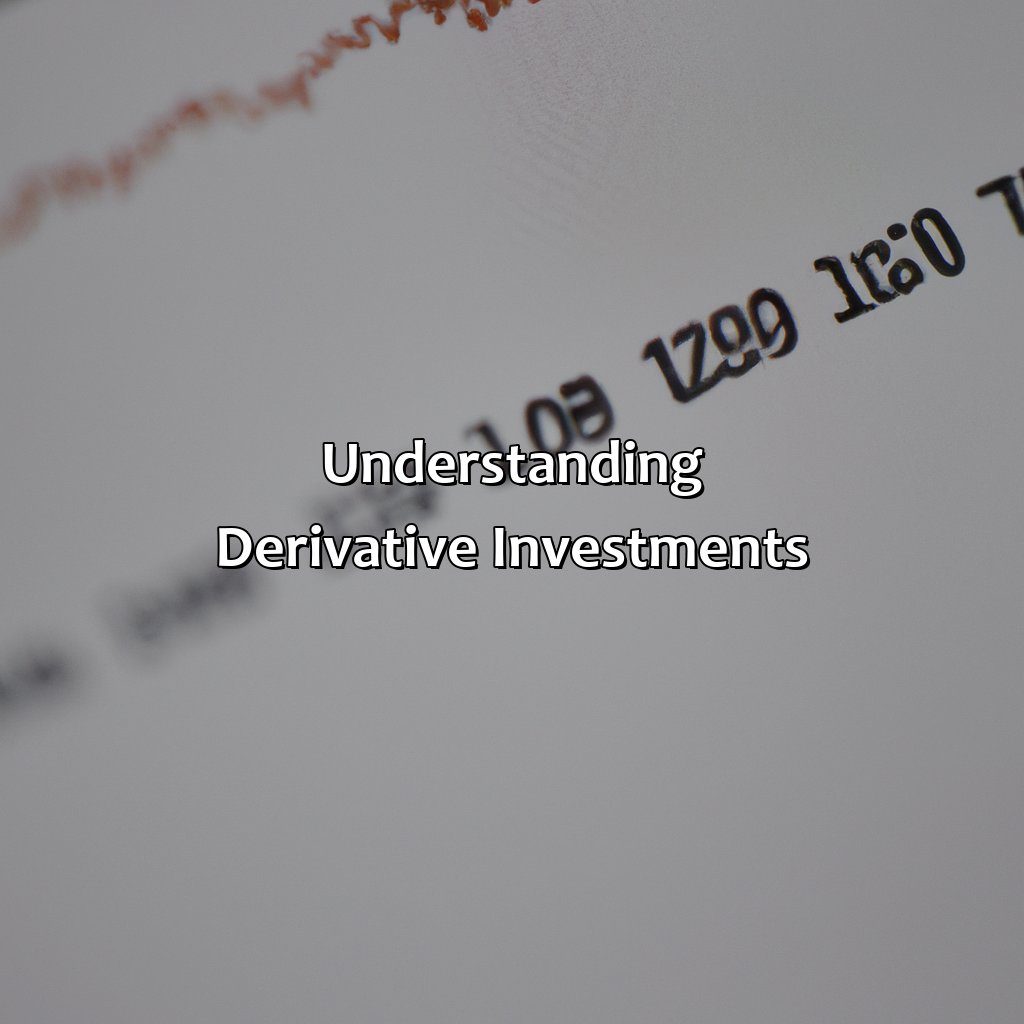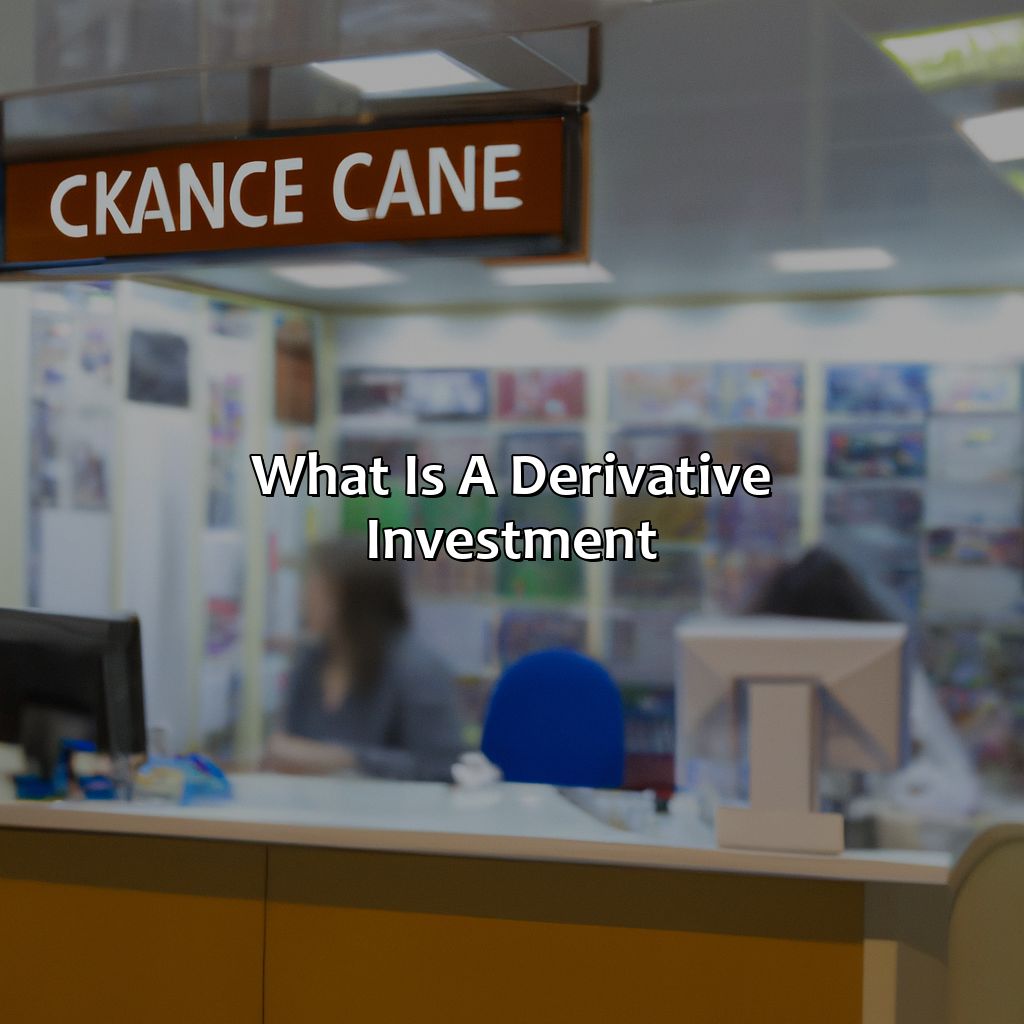What Is A Derivative Investment?
Key Takeaway:
- Derivative investments are financial contracts between two parties that derive their value from an underlying asset, such as stocks, bonds, commodities, or currencies. They are used for speculative, hedging, or arbitrage purposes.
- There are different types of derivative investments, such as options, futures, forwards, and swaps, each with their unique characteristics, risks, and benefits. Options, for example, provide the right, but not the obligation, to buy or sell an asset at a predetermined price and time. Futures, on the other hand, require buying or selling a standardized amount of an asset at a specific price and date.
- Derivative investments offer several advantages, such as increased liquidity, diversification, flexibility, and leverage. However, they also involve significant risks, such as market, credit, and operational risks, and require adequate knowledge, skills, and monitoring to be effective.
Are you considering investing in derivatives but are unsure what they are? This article explores the definition and benefits of derivative investments, giving you the information you need to make an informed decision.
Understanding Derivative Investments
Ready to get to grips with derivative investments? This guide will provide you with all the info! We’ll explore their forms, definitions and characteristics. Look out for the sub-sections that’ll introduce the definition, types and core characteristics. Get ready to understand derivative investments in full detail!

Image credits: retiregenz.com by Adam Washington
Definition of Derivative Investments
Derivatives are financial instruments whose value depends on the underlying asset or security. They can be traded without owning the underlying asset and commonly used for managing risks. Derivative investments allow investors to speculate on the future price movements of assets such as commodities, currencies, stocks, or bonds.
The most common types of derivatives are futures contracts, options contracts, and swaps. Futures contracts involve buying or selling an asset at a specified time in the future at a predetermined price. Options contracts give the holder the right but not obligation to buy or sell an asset at a set price before expiration while swaps allow two parties to exchange cash flows or other financial obligations based on an underlying asset.
Understanding derivative investments requires knowledge of complex financial concepts such as hedging, leverage, and speculation. Hedging involves using derivatives to protect against potential losses from adverse market movements while leverage enables traders to amplify returns by investing smaller amounts than required to buy the underlying assets. Speculation is a strategy where investors trade derivatives with the aim of gaining profits from market fluctuations.
Pro Tip: Derivatives can be risky investments and are not suitable for all investors. Consulting with a financial advisor before investing in these instruments can mitigate potential losses and increase chances of success. If you’re looking for a little excitement in your investment portfolio, derivatives are like the rollercoaster ride of the financial world.
Types of Derivative Investments
Derivative Investments come in various forms that are critical for investors who seek higher returns and have a risk appetite. These investments provide the opportunity to traders and investors to hedge against future price movements. Additionally, Derivative Investments provide exposure to unique underlying assets that would be challenging to trade without derivatives. A crucial characteristic of these derivative investments is the potential high returns but also higher risk.
The following table shows the Types of Derivatives:
| Types of Derivatives | Description |
| Options | These are contracts that give owners the right, but not the obligation, to buy or sell an underlying asset at a fixed price. |
| Futures | These are contracts between two parties in which they agree to exchange an asset for cash on a specific date in the future at today’s price. |
| Forwards | Similar to futures but without standardized values or traded on exchanges. Forward contracts are challenging for businesses looking to manage their currency exchange-related risks. |
| Credit Derivatives | Predicated on credit events such as defaults, bankruptcies, and other adverse financial events that negatively affect issuers’ ability to meet debt obligations. |
| Swaps | Used to exchange one type of cash flow for another. These are two parties agreeing on the specifics of exchanging cash flows, and it’s only based on market rates. |
These financial instruments date back several centuries ago. Derivatives were traded darkly in market corners until they entered the mainstream market in the early 1970s. They gained popularity when investors discovered how they could hedge and protect their portfolios against sudden economic shocks like inflation or currency fluctuations. Derivatives can be said to be where investing meets gambling, but with fancier terminology.
Characteristics of Derivative Investments
Derivative investments exhibit unique characteristics that set them apart from traditional investments. These instruments provide exposure to underlying assets without physically owning them, making it possible for investors to benefit from price fluctuations without holding the underlying asset. Derivatives are also highly leveraged and speculative in nature, which makes them riskier than traditional investments but also potentially more lucrative.
In addition, derivatives offer flexibility in terms of investment strategies as they can be used for hedging or speculation purposes. Common types of derivative investments include futures contracts, options, swaps and forwards. Each type of derivative has its own specific characteristics and use cases.
It is worth noting that derivative investments require a high degree of knowledge and expertise to navigate successfully. The complexity of these instruments means that investors must have a deep understanding of the underlying assets as well as the market conditions that may impact their value.
According to a report by BusinessWire, the global derivatives market accounted for $11.28 trillion in daily average turnover during the first half of 2020.
Derivatives: like a blind date, they can be exciting or disastrous, it all depends on how much you’re willing to gamble.
Benefits and Risks of Derivative Investments
To grasp the ups and downs of derivative investments, it’s necessary to know both the benefits and risks. So, we have split this ‘Benefits and Risks of Derivative Investments’ section into two:
- Advantages of Derivative Investments
- Disadvantages of Derivative Investments
These categories give you a thorough overview of the pros and cons. Thus, you can make an enlightened decision if derivatives are a right investment for you or not.

Image credits: retiregenz.com by Yuval Woodhock
Advantages of Derivative Investments
Derivative Investment Benefits Unveiled
Taking the plunge into derivative investments could be a highly lucrative move for investors and traders.
- Portfolio Diversification: Derivatives allow investors to diversify their portfolios by investing in various instruments like futures, options and swaps making it more resilient to market fluctuations.
- Leverage Trading: Derivatives offer both long and short-term trading opportunities, so investors can benefit from market changes in the future without having to buy underlying assets outright.
- Hedging Against Risks: Derivatives provide sophisticated risk management solutions against market volatility as they allow limiting potential losses through leveraged strategies, hedging or speculation on price movements.
Furthermore, they inherently contain high levels of liquidity due to their global exposure, making them easy-to-trade assets.
In recent years, there has been considerable debate surrounding the use of derivatives by large financial institutions. One such incident is of Barings Bank where its inability to effectively monitor trades led to significant financial losses and eventually bankruptcy. However, these situations do not negate the benefits that derivative investments offer if used responsibly. As long as derivatives are used prudently with proper risk management measures, it can undoubtedly be a valuable addition to an investor’s portfolio.
If you’re looking for an easy way to lose money, just invest in derivatives and watch your bank account disappear faster than Houdini in a straightjacket.
Disadvantages of Derivative Investments
Derivative investments can offer benefits, but they also have a downside. Here are some of the Disadvantages of investing in derivatives:
- High risk involved as these investments are highly leveraged and volatile.
- Complexity associated with derivatives requires profound knowledge and expertise before investing that can be expensive and may attract legal liability risks.
- Limited access to credible information due to opaque nature leaves investors in the dark about their investment decisions.
In addition to the above points, it is important to note that derivative investments can be challenging to understand for novice investors, leading to a higher potential for loss. It is vital always to seek professional advice before deciding to invest.
A businessman named Mr Raj invested $1 Million dollars in a commodity futures contract, hoping for significant gains; unfortunately, only after one month of taking such risk, he lost $250k due to lack of understanding how the derivative works. The bottom line: It pays to invest time and money in gaining knowledge thoroughly or consulting an expert before making any investment decisions.
Some Facts About Derivative Investment:
- ✅ A derivative investment is a financial contract whose value is based on an underlying asset or set of assets. (Source: Investopedia)
- ✅ Common types of derivative investments include futures, options, and swaps. (Source: The Balance)
- ✅ Derivative investments can be used for hedging, to manage risk or for speculative purposes to potentially earn profits. (Source: Forbes)
- ✅ One of the risks associated with derivative investments is the potential for high leverage, which means a small change in the underlying asset’s value can result in a much larger gain or loss. (Source: NerdWallet)
- ✅ The derivatives market is a large and important component of global financial markets, with an estimated notional value of over $500 trillion. (Source: MarketWatch)
FAQs about What Is A Derivative Investment?
What is a derivative investment?
A derivative investment is a financial contract that derives its value from an underlying asset. These assets can be stocks, bonds, commodities, currencies, or market indices. The value of a derivative does not come from any intrinsic value, but rather it depends on the value of the underlying asset it is linked to.
What are some common types of derivative investments?
Some common types of derivative investments include futures contracts, options, swaps, and forwards. Futures contracts involve agreeing to buy or sell an asset at a predetermined price at a future date. Options give the buyer the right, but not an obligation, to buy or sell an asset at a certain price. Swaps are agreements to exchange cash flows based on different financial variables.
Who can invest in derivative investments?
Derivative investments are typically bought and sold by professional investors, such as hedge funds or institutional investors. However, individual investors with some experience and knowledge of these investments can also invest in them through online trading platforms or through a financial advisor.
What are the risks associated with derivative investments?
Derivative investments can be highly complex and volatile, with prices that can fluctuate rapidly and unpredictably. They can also be highly leveraged, which means that small changes in the price of the underlying asset can have a significant impact on the value of the derivative. These risks can lead to significant losses, especially if an investor does not fully understand how the investment works.
Are derivative investments regulated?
Derivative investments are regulated by government agencies, such as the Securities and Exchange Commission (SEC) in the United States, to ensure that they are traded fairly and transparently. In addition, many financial institutions have their own risk management policies in place to manage the risks associated with these investments.
How can I learn more about derivative investments?
If you are interested in learning more about derivative investments, you can do research online or speak with a financial advisor. It is important to have a good understanding of these investments before investing any money, as they can be complicated and carry significant risks.


